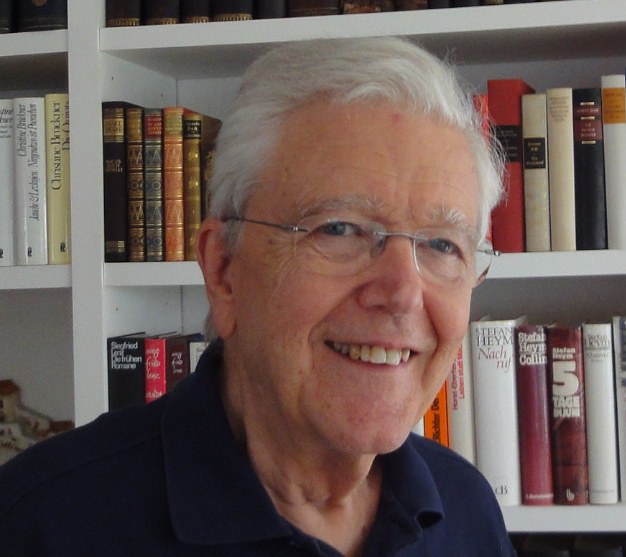Prof. Dr. Karl Schindler (1931 - 2023)
Obituary written by Reinhard Schlickeiser, Ralf-Jürgen Dettmar, Andreas Kopp and Harald Ziegler
 With his passing, we have lost an outstanding scientist, passionate university lecturer and unique colleague who was a great role model for many. Until his retirement in 1997, he was a full professor of theoretical physics and the first appointed holder of the Chair of Theoretical Physics IV: Space and Astrophysics at the Ruhr University Bochum. Even after his retirement, he remained associated with the institute and appeared regularly in his office until the beginning of the corona pandemic, in particular to maintain contact with his many scientific friends and successful students worldwide.
With his passing, we have lost an outstanding scientist, passionate university lecturer and unique colleague who was a great role model for many. Until his retirement in 1997, he was a full professor of theoretical physics and the first appointed holder of the Chair of Theoretical Physics IV: Space and Astrophysics at the Ruhr University Bochum. Even after his retirement, he remained associated with the institute and appeared regularly in his office until the beginning of the corona pandemic, in particular to maintain contact with his many scientific friends and successful students worldwide.
Karl Schindler was born in Aachen on October 26, 1931, the second of four sons. He was spared from military service, but had to witness the destruction of his father's cigar factory towards the end of the war. In order to rebuild it, his father had hoped that Karl Schindler would earn money at the Bundespost and bring it home as quickly as possible after leaving school in 1952. However, after successful intervention by his teachers at the grammar school in Alsdorf near Aachen, he was allowed to study physics at RWTH Aachen University. He successfully graduated in 1957 with a degree in physics. Karl Schindler obtained his doctorate in Aachen in 1961 with his research work "On the stability of plasma in static equilibrium" at the Institute for Plasma Physics at the Jülich Nuclear Research Facility of the State of North Rhine-Westphalia (KFA).
Karl Schindler remained faithful to theoretical plasma physics throughout his scientific life: first as a research assistant in Jülich from 1961 to 1968, then as a visiting scientist (1962-1964) at the Courant Institute for Mathematical Sciences, New York University, New York, USA and as a senior scientist (1966-1972) at the European Space Research Institute of ESRO, Frascati, Italy, from 1969 as its deputy director. At the same time, he taught at the Scuola di Perfezionamente di Fisica, University of Rome. From 1972-1973 he was Senior Scientist at the Max Planck Institute for Physics and Astrophysics, Institute for Extraterrestrial Physics, Garching. In 1973, he finally accepted the call of the Ruhr University Bochum to the newly created Chair of Theoretical Physics IV: Space and Astrophysics.
Karl Schindler was one of the leading applicants for the Bochum Collaborative Research Center 162 "Plasma Physics", which was funded by the German Research Foundation for 17 years, from 1973 to 1989. This SFB led to the close cooperation between plasma physics and astrophysics at the Faculty of Physics in Bochum, which still exists today. He was also instrumental in shaping the subsequent Collaborative Research Center 191 "Physical Foundations of Low Temperature Plasmas" (1990 - 2001). He was also successful in establishing the Volkswagen Foundation-funded junior research group "Topological Fluid Dynamics" (1999 - 2005) under the direction of his student Prof. Gunnar Hornig. Karl Schindler served as Dean of the Faculty of Physics, regularly gave lectures in theoretical physics and was a much sought-after examiner and supervisor of students' theses. Karl Schindler was very successful in supervising final theses. He combined methodological strength and a flair for interesting questions with an open, respectful, discursive and therefore inspiring working environment.
Many of his doctoral students in particular have since worked as leading scientists and professors at American and European institutes and universities. A central field of work of Karl Schindler and his students was the process of magnetic fusion, the so-called "reconnection", in space plasmas. He made many pioneering contributions in this field, which he described in his monograph "Physics of Space Plasma Activities", published by Cambridge University Press in 2007. With a methodological background in plasma physics, he has also made inspiring contributions to other fields (statistical mechanics, topology, stellar dynamics). Due to his more than 150 publications in first-class journals, Karl Schindler has been honored worldwide: he was Visiting Professor at Los Alamos National Laboratory in 2001, Fellow of the American Geophysical Union in 1993 and Orson Anderson Scholar of 2001 at IGGP, Los Alamos, New Mexico, USA. In 2014, he received the highly prestigious Hannes Alfvén Medal of the European Geosciences Union (EGU) for his work.
His professional expertise and his reserved, balanced, empathetic and amiable personality have left a great and lasting impression. We will miss him very much. Our sympathy goes out to his family.
Photo: Ruhr Universität Bochum - Physik und Astronomie



